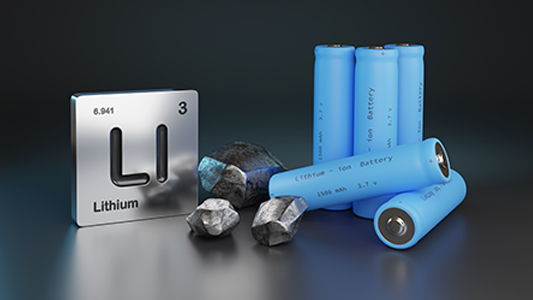In the last few years, there has been a huge increase in the lithium-ion battery market, driven by the increasing product demand for portable electronic devices, due to their longer shelf life and advanced performance. In addition, rising demand for electric vehicles (EVs) and renewable energy storage systems, due to developing consumer focus on a reduction in global carbon dioxide emissions is predicted to witness upward growth.
Furthermore, the drop in demand for lead-acid batteries because of Environmental Protection Agency (EPA) guidelines on lead pollution and the following environmental hazards and storage, disposal, and recycling of lead-acid batteries has brought about a rise in demand for Li-ion batteries in automobiles.
On the other hand, Mexico has been a first-rate recognition for the global automotive industry as companies from all over the world are making investments in the country. It is the fourth biggest exporter in the automotive industry, after Germany, Japan, and South Korea. The growing vehicle manufacturing in the country is anticipated to increase the demand for lithium-ion battery products.
According to a recent report published by Allied Market Research, the global lithium-ion battery market is expected to exhibit an outstanding CAGR of 15.2% from 2023 to 2032.
Growing sales of electric vehicles to control climate change-
Electric vehicles have a lower climate impact compared to internal combustion engines. Governments worldwide are moving towards greener and pollution-free mobility as passenger and commercial vehicles are changing the future traffic trends, which is sure to boost the growth of the lithium-ion battery market. Electric vehicle companies like Tesla pioneered the use of these batteries in cars. Europe has strict emission regulations & norms and implemented large public e-mobility projects. In addition, the growing acceptance of lithium-ion battery devices in the health & medical sector is also supporting the growth of the industry.
Portable electronic devices to fuel the market growth-
Lithium-ion batteries are generally used in electronic devices such as laptops, smartphones, digital watches, clocks, and remote controls. Sales of consumer electronics are highly dependent on the population and spendable income of a country. Nowadays, rising spendable incomes in India have led to rising living requirements, which has boosted demand for consumer electronics.
Lithium-ion battery technology offers greater desirable energy density in Joules of energy per kilogram than previous battery technology such as nickel-metal hydride (NiMH) and nickel-cadmium (NiCd). Lithium-ion cell’s self-discharge rate is much lower than other rechargeable cells which have won popularity. Therefore, the supply of smaller batteries that retain a better charge became important for electronic device’s energy requirements.
In recent years, the accessibility of the Internet at a considerably low price has increased smartphone penetration in India. With fast and cheap mobile data speeds and the second-largest population in the world, India has lots to provide within the smartphone business. Most Indians use smartphones to connect with the Internet, developing a huge market for various mobile phone producers. About 29.60 million smartphones were shipped in India in the last quarter of 2022.
As per the growing demand for lithium-ion batteries, the prominent players in the market such as Toshiba Corporation., Saft Group S.A., SAMSUNG SDI CO., LTD., BYD Company, and A123 Systems LLC are investing heavily in establishing distribution network and supply chain, research and development to improve battery performance, and collaborative partnerships to dominate their position in the global market. For instance, In September 2021, Sojitz Corporation, Toshiba Corporation, and CBMM signed a joint development agreement (JDA) to capitalize next-generation lithium-ion batteries using niobium-titanium oxide as the anode material.
Another significant development in May 2021, the commercial motor vehicle manufacturer (CMV) Daimler Truck AG and lithium-ion battery manufacturer CATL have expanded their existing partnership based on a shared vision of CO2-neutral electric transportation. CATL will supply lithium-ion batteries for the Mercedes-Benz eActros Longhaul battery-electric vehicle, which will be ready for series production in 2024.
Conclusion:
Thus, it can be asserted that the global lithium-ion battery market is witnessing rapid growth due to advances in battery technology and efforts to improve durability, making it an exciting and dynamic industry to watch.
Author’s Bio: – Harshada Dive is an engineer by qualification. She has previous experience working as a customer service associate. As an associate content writer, she loves to experiment with trending topics and develop her unique writing skills. When she’s not writing, Harshada enjoys gardening and listening to motivational podcasts.












